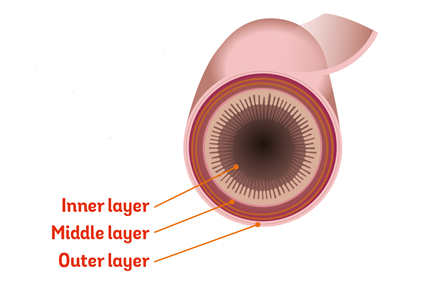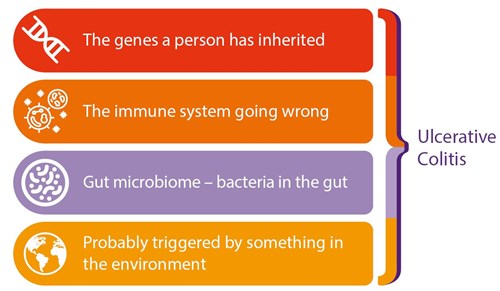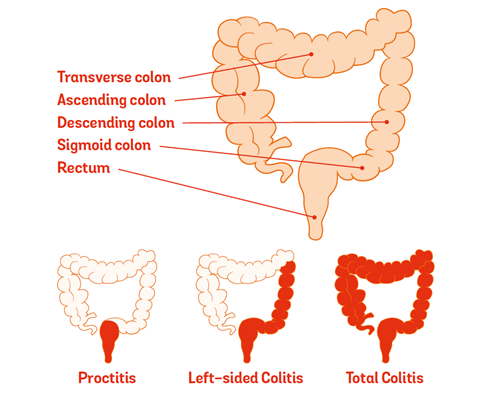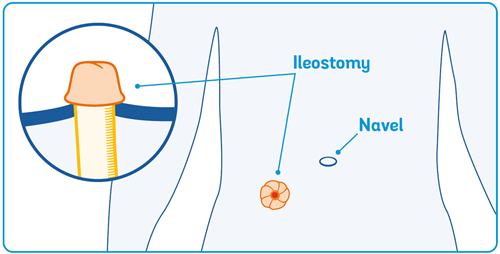Skin
Colitis can affect the skin in different parts of the body.
Erythema nodosum affects between 2 and 10 in every 100 people with Colitis. It causes raised, painful patches of skin that look red or darker than the surrounding skin. It is often found on the legs. It usually occurs during flare-ups and usually improves with treatment for Colitis.
Pyoderma gangrenosum is a less common condition in people with Colitis. This starts as small tender blisters or pustules, which become painful, deep ulcers. On brown or black skin, the skin around the edge of the ulcer might be darker. Pyoderma gangrenosum can occur anywhere on the skin, but most commonly appear on the legs, or near stomas. This condition is sometimes, but not always, linked to a flare-up. It’s often treated with steroids or biologic medicines, such as infliximab. In some cases, a specialist in skin conditions, known as a dermatologist may treat this with creams or ointments.
Anaemia
Around 1 in 5 people with Colitis develop anaemia. There are several types of anaemia. People with Colitis are likely to develop iron deficiency anaemia. It is caused by a lack of iron in your diet, poor absorption of iron from food, or blood loss from the gut. Your body needs iron to help make red blood cells, which carry oxygen around your body.
Anaemia can make you feel very tired. If it’s more severe you may also have:
- Shortness of breath
- Headaches
- General weakness
Treatment depends on the cause of anaemia. You may be prescribed iron supplements that are taken by mouth. Or you may be given iron into your vein, known as intravenously, either by an injection or infusion through a drip. Find out more about iron in our information on other treatments.
Bones
People with Colitis are more at risk of developing thinner and weaker bones, known as osteoporosis. This can be due to ongoing inflammation, smoking, taking steroids or low levels of physical activity. Calcium is needed for making bones, and this may be low if your diet doesn’t contain enough dairy. Weight-bearing exercise, calcium and vitamin D supplements, not smoking and avoiding long-term steroid use can help. For some people, medicines can be helpful. Find out more in our information on bones.
Liver
Primary Sclerosing Cholangitis, known as PSC affects around 1 in every 100 people with Colitis. PSC causes inflammation of the bile ducts and can eventually damage the liver. Symptoms can include:
- Pain in the top right of the tummy
- Itching
- Fatigue
- Weight loss
- Your skin and the whites of your eyes becoming yellow, known as jaundice
Some people do not get any symptoms and it may only be picked up on blood tests.
Some medicines used to treat Colitis, such as azathioprine, can affect the liver. Changing your treatment may help to reduce this type of liver complication.
Mouth
It is also common for people with Colitis to get sores or ulcers in their mouth, usually when their condition is active. These sores can be minor and disappear within a few weeks but can occasionally last longer and may need topical steroid treatment.
Hair
Losing more hair than usual is common with Colitis. Many things can trigger this, including severe flares, poor nutrition, iron and zinc deficiency and surgery. This type of hair loss is called telogen effluvium. Less often, hair loss may be a side effect of medicines. You should not stop taking a medicine unless your doctor has told you to. Losing your hair can be distressing, but it’ll usually grow back as you get better. Speak to your IBD team to check what might be causing your hair loss.
Heart and circulation
Cardiovascular disease
People with active Colitis may have a slightly increased risk of cardiovascular disease, including heart problems and strokes.
You can reduce the risk of having heart problems or a stroke by:
- Eating a healthy, balanced diet
- Not smoking
- Exercising regularly
- Keeping an eye on your blood pressure and cholesterol levels












 Become a member: Find out about the benefits of joining our amazing community
Become a member: Find out about the benefits of joining our amazing community